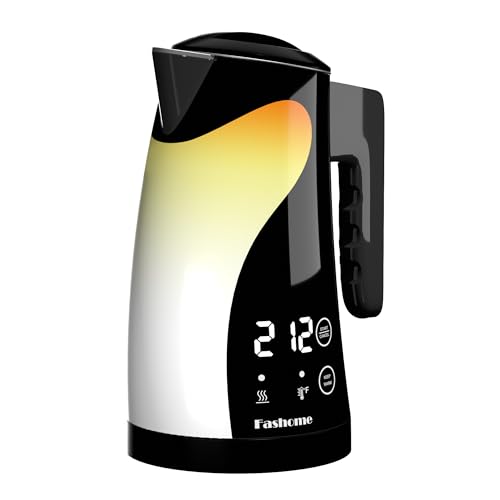

If you have ever noticed a white, chalky residue on the inside of your electric kettle, then you are familiar with hard water deposits. These deposits are caused by minerals, such as calcium and magnesium, in your tap water. Over time, these minerals can build up and affect the performance of your kettle, making your boiled water taste funny or even decreasing the efficiency of the heating element.
Cleaning hard water deposits from your electric kettle is a simple and cost-effective solution to improve its functionality and extend its lifespan. With just a few household ingredients and a little bit of time, you can easily remove the stubborn mineral buildup and restore your kettle to its pristine condition.
Vinegar is your best friend when it comes to removing hard water deposits. The acidic nature of vinegar helps dissolve and loosen the mineral buildup. To start the cleaning process, fill your kettle halfway with equal parts vinegar and water. Let the mixture sit in the kettle for about an hour, or overnight for more stubborn deposits.
Remember to not plug in the kettle or turn it on during this cleaning process. After the vinegar mixture has soaked, empty the kettle and rinse it thoroughly with clean water. Use a soft brush or sponge to scrub away any remaining residue. For hard-to-reach areas, you can use a toothbrush or cotton swab.
If the vinegar alone didn’t do the trick, baking soda can be your secret weapon. Create a paste by mixing baking soda with a small amount of water. Apply the paste to the affected areas of the kettle and let it sit for a few minutes. Then, scrub the deposits away with a brush or sponge. Rinse the kettle thoroughly with clean water to remove any leftover residue.
Regularly cleaning your electric kettle will not only keep it looking new, but it will also ensure that you are enjoying clean-tasting boiling water. By following these simple steps using vinegar and baking soda, you can easily remove hard water deposits and prolong the life of your kettle.
Why Hard Water Deposits Are a Problem in Electric Kettles
Electric kettles are a convenient and efficient way to heat water for various purposes. However, over time, hard water deposits can build up inside the kettle, affecting its performance and longevity. Hard water contains minerals, such as calcium and magnesium, which can leave behind deposits when heated and boiled.
1. Reduced Efficiency: The accumulation of hard water deposits can create a layer of scale on the heating element and inside the kettle, which reduces its efficiency. The scale acts as an insulator, preventing efficient heat transfer and prolonging the boiling time.
2. Unpleasant Taste and Odor: Hard water deposits can alter the taste and smell of the water boiled in the kettle. This can be particularly noticeable when making tea or coffee, as the minerals in the deposits can interfere with the flavors of the beverages.
3. Increased Energy Consumption: The presence of hard water deposits reduces the efficiency of the heating element, resulting in increased energy consumption. The kettle will need to stay on for a longer time to reach the desired temperature, leading to higher electricity bills.
4. Potential Damage to the Kettle: The build-up of hard water deposits can cause damage to the kettle over time. The scale can clog the spout, making it difficult to pour water, and may even cause the kettle to malfunction or stop working altogether.
5. Health Concerns: While hard water deposits themselves are not harmful to health, they can create an environment conducive to the growth of bacteria and other microorganisms. Regular cleaning and descaling of the kettle are essential to prevent any potential health risks.
Regular descaling of electric kettles is necessary to maintain their performance and ensure clean and safe boiling water. By understanding the problems associated with hard water deposits, you can take the necessary steps to keep your electric kettle in optimal condition.
Effects of Hard Water Deposits on Electric Kettles
When using an electric kettle, it is important to be aware of the potential effects of hard water deposits. Hard water contains high levels of minerals such as calcium and magnesium, which can build up and create deposits in the kettle over time.
These deposits can have several negative effects on the performance and lifespan of the electric kettle:
Limited Efficiency
Hard water deposits can hinder the heating element’s ability to heat the water efficiently. The layer of mineral deposits acts as an insulator, making it harder for the heat to transfer from the element to the water. As a result, it takes longer for the water to come to a boil, leading to increased energy consumption and a slower boiling process overall.
Unpleasant Taste and Odor
The minerals in hard water can also affect the taste and odor of the boiled water. The deposits can impart a metallic or bitter taste, which can be noticeable in both hot and cold beverages made with the water from the kettle. This can be particularly frustrating when brewing tea or coffee, where the flavor can be negatively affected.
Furthermore, the deposits may release an unpleasant odor, which can be off-putting when using the kettle for cooking or preparing hot drinks.
Reduced Lifespan
Over time, the accumulation of hard water deposits in the kettle can lead to reduced lifespan and potential damage. The mineral build-up can cause the heating element to overheat, affecting its performance and eventually causing it to fail. It may also result in malfunctioning of other components, leading to expensive repairs or the need to replace the kettle entirely.
To avoid these negative effects, it is important to regularly descale the electric kettle and remove any hard water deposits. This will not only improve the efficiency and performance of the kettle but also ensure the longevity of this essential kitchen appliance.
Remember: Prevention is key! Using filtered or distilled water in the electric kettle will significantly reduce the accumulation of hard water deposits and prolong its lifespan. Regular maintenance and cleaning will also help keep your electric kettle in top shape and ensure a clean and enjoyable boiling experience every time.
Effective Methods to Remove Hard Water Deposits from Electric Kettles
Hard water deposits can quickly accumulate inside an electric kettle, causing it to become inefficient and affecting the taste of your boiled water. Fortunately, there are several effective methods to remove these deposits and restore your kettle to its optimal condition.
1. Vinegar and Water Solution:
One of the most popular and effective methods is using a vinegar and water solution. Simply fill the kettle with equal parts vinegar and water, then let it soak for at least one hour or overnight for stubborn deposits. After soaking, boil the solution, then let it cool down before rinsing the kettle thoroughly. Vinegar has natural acidic properties that help break down the mineral deposits.
2. Lemon Juice:
If you prefer a more natural cleaning method, lemon juice can be used to remove hard water deposits. Squeeze the juice of a lemon and mix it with water in equal parts. Pour this solution into the kettle and let it soak for about an hour. Boil the solution, then allow it to cool before rinsing the kettle thoroughly. The citric acid in lemon juice helps dissolve the mineral deposits.
3. Baking Soda:
Another effective method is using baking soda. Mix one to two tablespoons of baking soda with water to create a paste. Apply this paste to the areas with hard water deposits and leave it on for about 15 minutes. Scrub the deposits using a soft brush or sponge, then rinse the kettle thoroughly. Baking soda is known for its mildly abrasive properties that can help remove stubborn deposits.
4. Commercial Descaling Products:
If you prefer a ready-made solution, there are several commercial descaling products available in the market. Follow the instructions provided by the manufacturer to effectively remove the hard water deposits. These products are specifically designed to dissolve mineral deposits and restore the kettle’s performance.
5. Regular Cleaning and Maintenance:
To prevent the buildup of hard water deposits in the future, it is essential to clean and maintain your electric kettle regularly. Empty and rinse the kettle after each use, and descale it at least once a month, or more frequently if needed.
Remember to always read the manufacturer’s instructions before using any cleaning method or product to ensure the safety and longevity of your electric kettle.
Q&A
Why is there a buildup of hard water deposits in my electric kettle?
Hard water contains minerals such as calcium and magnesium that can form deposits when the water is heated. These deposits can accumulate in your electric kettle over time.
How do hard water deposits affect the taste of boiled water?
Hard water deposits can give boiled water an unpleasant taste and odor. The minerals in the deposits can alter the flavor and make the water taste metallic or bitter.
What are some natural methods to remove hard water deposits from an electric kettle?
Vinegar is one of the most commonly used natural ingredients to remove hard water deposits. Simply fill the kettle with equal parts vinegar and water, let it sit for a few hours, and then rinse thoroughly. Another method is to use lemon juice and water. The citric acid in lemon juice helps dissolve the deposits. Alternatively, you can use a mixture of baking soda and water to scrub away the deposits.







